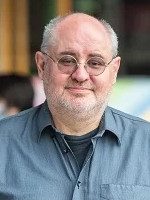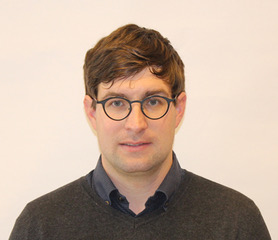Invited speakers
Rudolf Rosa (Charles University, Prague, Czech Republic): THEaiTRE: Automatically generating theatre play scripts

In February 2021, we staged the first theatre play for which 90% of the script was automatically generated by an artificial intelligence system.
The THEaiTRobot system is based on the GPT-2 language model, created by the OpenAI consortium, complemented with automated translation. We had to adapt the model in various ways, especially to avoid repetitiveness and forgetting of context, and to stick to a limited set of characters. As input for the system, we used short starting prompts (scene setting and first few lines of dialogue), prepared by a dramaturge, which were expanded into full scenes by THEaiTRobot. The script was then post-edited and put on stage. Reviews mostly noted that AI cannot really write a good play (yet), but acknowledged that the performance was mostly interesting and entertaining to watch.
We faced numerous limitations with our approach. We could only generate individual scenes independently, with a limited number of characters, and with the character personalities often randomly switching and merging. Also, the system does not see beyond the text of the script, lacking the understanding of the relation of the script to what is happening on stage. We are currently working on a new version of the system, which should improve on some of the issues, while also further minimizing the amount of human influence. It should also incorporate the concept of dramatic situations into the generation process.
The THEaiTRE project is related to other similar attempts, such as the play Lifestyle of the Richard and Family, the musical Beyond the Fence, the short movie Sunspring, or the performances of the Improbotics theatre group, all of which use automatically generated content to some extent. Our play stands out among these projects by being rather long (60 minutes) while having a very high proportion of automatically generated content (90%).
Rudolf Rosa is a computational linguist, focusing on automatic generation of texts, multilingual processing, and interpretation of artificial neural networks. Since 2011, he has been doing research at the Institute of formal and applied linguistics at Charles University in Prague, currently at the position of a research associate. Currently, Rudolf is the head of the THEaiTRE research project.
Johannes Fürnkranz (Johannes-Kepler University, Austria): Towards Deep and Interpretable Rule Learning

Inductive rule learning is concerned with the learning of classification rules from data. Learned rules are inherently interpretable and easy to implement, so they are very suitable for formulating learned models in many domains. Nevertheless, current rule learning algorithms have several shortcomings.
First, with respect to the current praxis of equating high interpretability with low complexity, we argue that while shorter rules are important for discrimination, longer rules are often more interpretable than shorter rules, and that the tendency of current rule learning algorithms to strive for short and concise rules should be replaced with alternative methods that allow for longer concept descriptions.
Second, we think that the main impediment of current rule learning algorithms is that they are not able to learn deeply structured rule sets, unlike the successful deep learning techniques. Both points are currently under investigation in our group, and we will show some preliminary results.
Prof. Johannes Fürnkranz is a professor and head of the Institute for Application-Oriented Knowledge Processing (FAW) at the Johannes-Kepler University Linz. Before that, he was Associate Professor for Knowledge Engineering at TU Darmstadt, Germany, and a Senior Post-Doc Researcher at the Austrian Research Institute for Artificial Intelligence, and, for one year, a post-doc researcher at Carnegie Mellon University. His main research interest is machine learning, in particular inductive rule learning and preference learning, and their applications in Game Playing, Web Mining, and Data Mining in the Social Sciences. He is the editor-in-chief of the journal "Data Mining and Knowledge Discovery", and a regular senior member of programm committees of premier conferences in artificial intelligence, machine learning, data mining, and game playing, and served as the program co-chair of several conferences, including ECML-PKDD 2006 (Berlin) and ICML 2010 (Haifa).
Jan Goedgebeur (KU Leuven, Belgium): An introduction to computational graph theory and generation algorithms

Computers are often used in combinatorics to determine if combinatorial objects with given structural or extremal properties exist as these existence problems are often too complex to solve by hand. This is done by designing and implementing generation algorithms which construct combinatorial objects from a given class (typically avoiding the generation of isomorphic copies) and analysing the resulting objects.
In this talk we will give an introduction to computational graph theory and the design of generation algorithms in particular. We will also give concrete examples of how these generation algorithms have helped to gain new insights and solve problems in mathematics and in chemistry.
Jan Goedgebeur is an assistant professor in the Department of Computer Science at KU Leuven. He obtained his PhD in Computer Science at Ghent University and was a postdoc at Ghent University and Université de Mons and also spent some time at the Australian National University.
His research is in algorithmic and computational graph theory. His main research interest is the design and efficient implementation of algorithms to solve problems from graph theory and related areas which are too complex to handle by hand.
Andrej Lúčny (Comenius University, Bratislava, Slovakia): Towards one-shot Learning via Attention

Though the deep neural networks enabled us to create systems that would be incredible ten years ago, still most of them learn gradually and offline. We introduce an approach to how to overcome this limitation. We have implemented it by the well-known attention mechanism that transforms one latent space into another using a list of key-value pairs defining the correspondence between points in the two spaces. We can express any point in the first space as a mixture of keys and map it to a point in the second space that is an analogical mixture of values. While encoders and decoders of the two spaces we train only gradually, the keys and values of the transformation we can extend online so that we constantly only improve the mapping quality, achieving the perfect mapping of the current situation immediately. We demonstrate our approach to the simplified imitation task in the human-robot interaction, mapping the representations of the seen body and the robot's body.
Andrej Lucny has obtained his Ph.D. degree from the Department of Applied informatics of the Faculty of Mathematics, Physics, and Informatics at the Comenius University in Bratislava. He deals with architectures for integrating artificial intelligence methods in robotics and computer vision domains.





